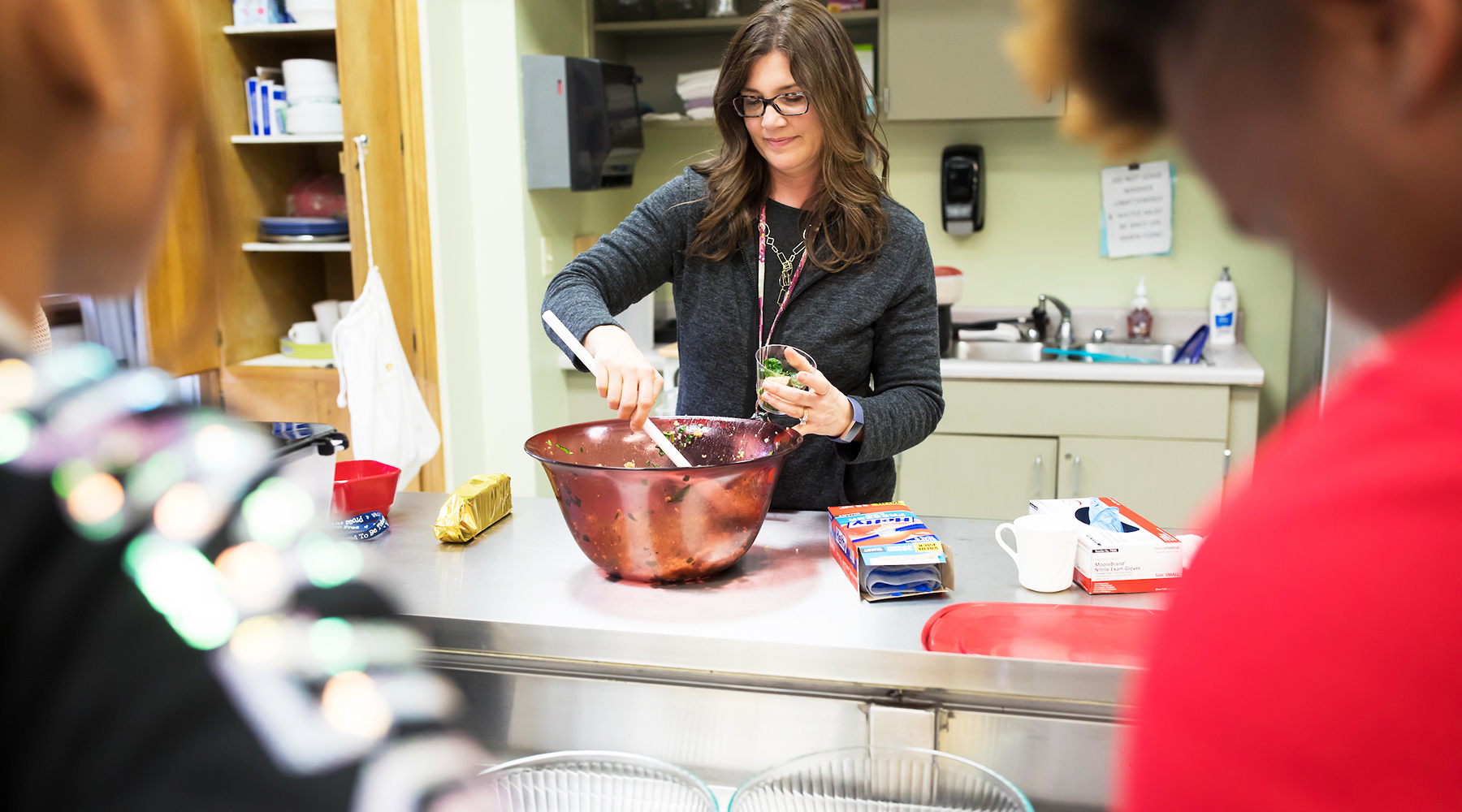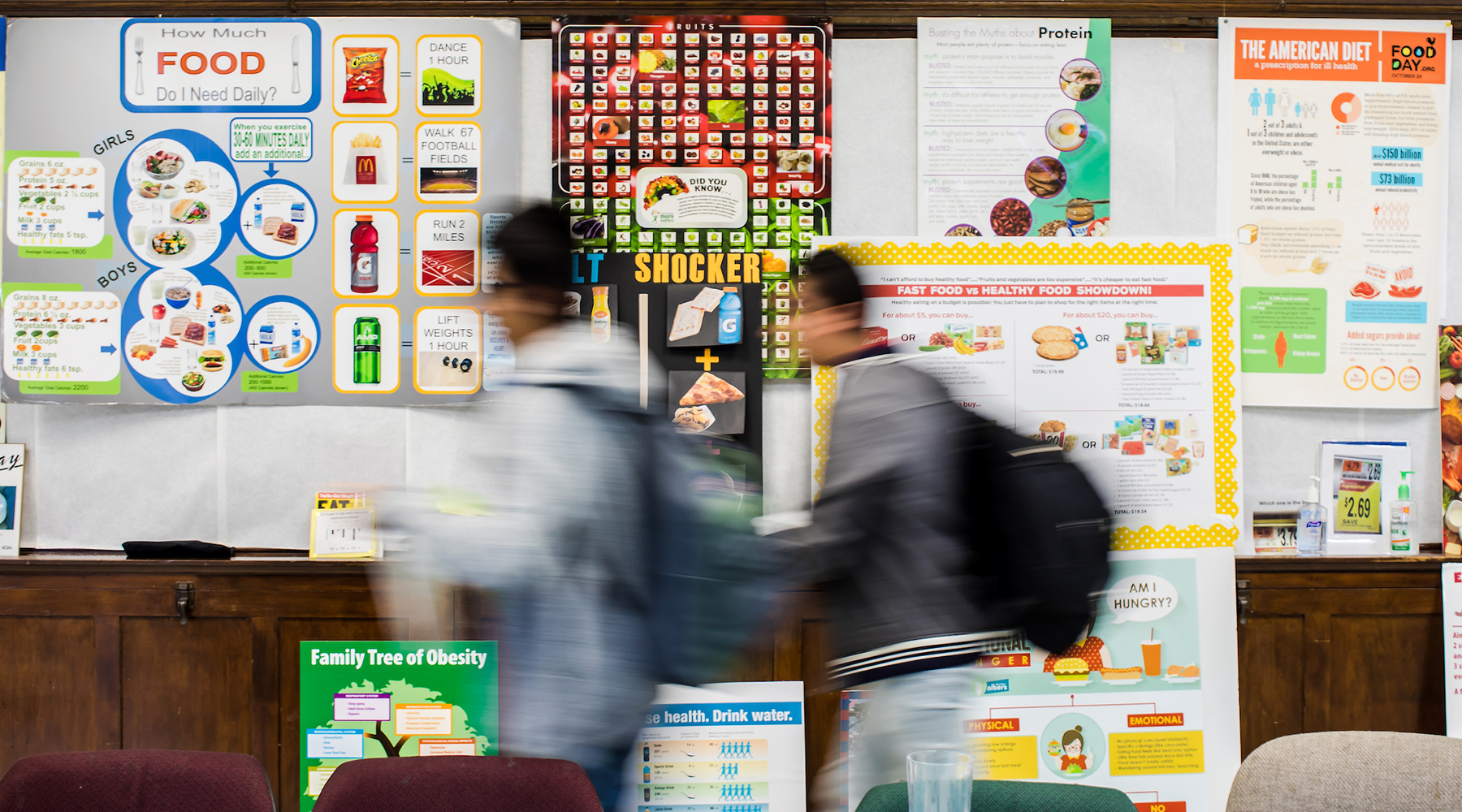Loyolans for Others

Before COVID-19, Kelly Sierra lead a program at Proviso East High School in Maywood that teaches teens about healthy eating and provides them with a free, nutritional lunch.
Loyolans for Others (in Uncertain Times)
Dietetics interns and nutrition students help provide healthy meals to vulnerable communities
Loyola University Chicago has a rich history of strong community partnerships. As a pandemic nearly shuts down Chicago, members of those enduring partnerships are helping supply meals to vulnerable people in neighboring communities.
At Lake Shore Campus, the Loyola Community Nursing Center provides health and nutrition services to dozens of local families and individuals. When the coronavirus (COVID-19) outbreak led to a shelter-in-place order for Illinois residents, access to nutritious meals became a concern.
That’s when Monica Dillon, the health center’s longtime leader, took charge. She helped organize a local response team focused on food security and, with the help of students from the Parkinson School of Health Sciences and Public Health and the Marcella Niehoff School of Nursing, developed a creative solution for Chicago’s Rogers Park and Edgewater neighborhoods.
“She reached out to our dietetic and nutrition interns to create shopping lists and recipes with nutrient-dense, non-perishable food items,” says Joanne Kouba, an associate professor at Parkinson. “Even though we are under these extreme, disruptive times, we want people to be well-nourished and avoid exacerbating issues like weight, diabetes, and hypertension, all chronic health problems impacted by nutrition.”

Informational posters on nutrition hang in the Lunch Bunch room at Proviso East High School. (Photo taken in 2019 before schools were closed)
After interning at the nursing center for the past several months and getting to know the patients, Andrea Ravlin was disappointed when she had to end her clinical work early because of the coronavirus pandemic. She says having this new opportunity to serve the community again was rewarding.
“A lot of our internship is working with patients face-to-face, and we’ve really been thrown into a new situation,” Ravilin says. “I’m grateful that I’ve been able to use everything I’ve learned about nutrition throughout the year to serve these vulnerable populations.”
With shopping lists in hand that Ravlin and other dietetic students created, community volunteers are working with local grocers and the nursing center to create and distribute food bundles, complete with healthy meal recipes.
“It is an excellent and meaningful activity for our students. It allowed them to see what emergency food disaster management looks like, what people need, how they connect, and the importance of community relationships and partnerships,” says Kouba, who helps with Veggie Rx, a similar project serving Maywood and surrounding neighborhoods.
“It is an excellent and meaningful activity for our students. It allowed them to see what emergency food disaster management looks like, what people need, how they connect, and the importance of community relationships and partnerships.”
A USDA-sponsored food distribution program at Loyola’s Health Sciences Campus, Veggie Rx provides fresh produce to people living with food insecurity and chronic disease so they can enjoy healthier food options that help improve their well-being. Every Monday, around 40 or 50 people visit the Maywood Park District to collect fresh fruit and vegetables from local farmers, watch cooking demonstrations, and gather as a community.
Like the Loyola Community Nursing Center, Veggie Rx is adapting so it can continue to provide nutritious and healthy food. Rather than gathering at the Maywood Park District, the program has moved to a drive-up or pick-up system, with volunteers placing bags of produce in people’s cars. And, instead of live cooking demonstrations and community gatherings, dietetic interns follow up with phone calls to participants and offer cooking lesson videos on social media.
“We’re not able to check on their physical health or condition,” Kouba says, “but Loyola is staying connected with the community which is essential during this time.”

Community impact, outreach, and service are backbones of the Loyola University Chicago mission. As COVID-19 brought uncertain times to Chicago, Parkinson School of Health Sciences and Public Health and the Marcella Niehoff School of Nursing students were called to serve as they had been taught. Loyola is proud of the work students, faculty, and staff are doing amid the coronavirus outbreak. If you are a registered dietitians wanting to learn about community outreach and leadership, a MS in Dietetics at Loyola University Chicago could be the next step for you. Learn More
Dietetics interns and nutrition students help provide healthy meals to vulnerable communities
Loyola University Chicago has a rich history of strong community partnerships. As a pandemic nearly shuts down Chicago, members of those enduring partnerships are helping supply meals to vulnerable people in neighboring communities.
At Lake Shore Campus, the Loyola Community Nursing Center provides health and nutrition services to dozens of local families and individuals. When the coronavirus (COVID-19) outbreak led to a shelter-in-place order for Illinois residents, access to nutritious meals became a concern.
That’s when Monica Dillon, the health center’s longtime leader, took charge. She helped organize a local response team focused on food security and, with the help of students from the Parkinson School of Health Sciences and Public Health and the Marcella Niehoff School of Nursing, developed a creative solution for Chicago’s Rogers Park and Edgewater neighborhoods.
“She reached out to our dietetic and nutrition interns to create shopping lists and recipes with nutrient-dense, non-perishable food items,” says Joanne Kouba, an associate professor at Parkinson. “Even though we are under these extreme, disruptive times, we want people to be well-nourished and avoid exacerbating issues like weight, diabetes, and hypertension, all chronic health problems impacted by nutrition.”
After interning at the nursing center for the past several months and getting to know the patients, Andrea Ravlin was disappointed when she had to end her clinical work early because of the coronavirus pandemic. She says having this new opportunity to serve the community again was rewarding.
“A lot of our internship is working with patients face-to-face, and we’ve really been thrown into a new situation,” Ravilin says. “I’m grateful that I’ve been able to use everything I’ve learned about nutrition throughout the year to serve these vulnerable populations.”
With shopping lists in hand that Ravlin and other dietetic students created, community volunteers are working with local grocers and the nursing center to create and distribute food bundles, complete with healthy meal recipes.
“It is an excellent and meaningful activity for our students. It allowed them to see what emergency food disaster management looks like, what people need, how they connect, and the importance of community relationships and partnerships,” says Kouba, who helps with Veggie Rx, a similar project serving Maywood and surrounding neighborhoods.
A USDA-sponsored food distribution program at Loyola’s Health Sciences Campus, Veggie Rx provides fresh produce to people living with food insecurity and chronic disease so they can enjoy healthier food options that help improve their well-being. Every Monday, around 40 or 50 people visit the Maywood Park District to collect fresh fruit and vegetables from local farmers, watch cooking demonstrations, and gather as a community.
Like the Loyola Community Nursing Center, Veggie Rx is adapting so it can continue to provide nutritious and healthy food. Rather than gathering at the Maywood Park District, the program has moved to a drive-up or pick-up system, with volunteers placing bags of produce in people’s cars. And, instead of live cooking demonstrations and community gatherings, dietetic interns follow up with phone calls to participants and offer cooking lesson videos on social media.
“We’re not able to check on their physical health or condition,” Kouba says, “but Loyola is staying connected with the community which is essential during this time.”
